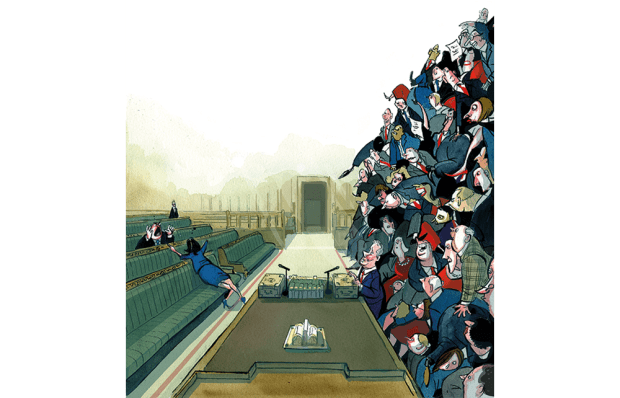Saving general practice
Sir: Regarding J. Meirion Thomas’s article (‘Medical emergency’, 4 June), traditional general practice continues to thrive in private medicine. For a 20-minute consultation costing £80, a patient can still get a rapid face-to-face appointment. I believe historians will record that NHS general practice reached its zenith in the mid-1990s when John Major was PM and most patients phoned their GP before calling an ambulance. The rot set in under Tony Blair, when he abolished ‘fund-holding’ (a good example of levelling-down) and we lost control of waiting lists and many ‘in-house’ services such as physiotherapy, counselling and minor surgery. The end came under Gordon Brown and the new contract, so that few GPs now provide end-of-life/palliative care, obstetrics and emergency treatment. If general practice is to recover within the NHS, we must look at a European model where the pay system encourages doctors to practise medicine and gives patients the power to choose whom they wish to see and when.
John O’Sullivan (retired GP)
Hursley, Winchester
What’s up, doc?
Sir: J. Meirion Thomas may be correct that general practice needs reform but he is wrong to question why GPs suffer from burnout when their work is ‘less complicated’ than that of hospital doctors. A GP has to deal with a static population, many of whom are economically disadvantaged, psychologically frail, chronically unwell and elderly. Not to mention the chronic complainers and addicts. The GP has to be social worker and counsellor while still meeting government targets.
In hospitals, particularly in surgical practice, patients present defined problems with definite solutions and the carousel moves on. In 30 years of vascular surgery, I never had a problem with ‘life and death decisions’ and indeed would have done the job for half the salary; no amount of money would have compensated for the quotidian demands of general practice.
Alan Cameron MCh, FRCS, retd surgeon
Ipswich, Suffolk
A living collection
Sir: I write as a former surveyor of the Queen’s pictures (1988-2005) to contest the view expressed by Jack Wakefield (Arts, 4 June) that the royal collection has become an anachronism. It is in fact a unique survival. In so far as it is incorporated within those buildings which for many centuries have been associated with monarchy, it is in truth a ‘living’ collection honouring the past and respecting the present. There is nothing moribund about it, and when the royal household acknowledged its independence in 1987 with the appointment of the first director, modern museum practices were accelerated, including increased accessibility.
Mr Wakefield emphasises the paintings, which by any standards are remarkable, but he seems not to realise that these are considerably outnumbered by those works associated with the decorative arts and the varied holdings of the royal library. As surveyor, I had responsibility for roughly 7,000 pictures and 3,000 miniatures, whereas the surveyor of the Queen’s works of art and the librarian were between them in charge of many hundreds of thousands of objects. The redistribution of such an amount of material would present problems of display and of storage on a considerable scale. The royal collection should remain in those buildings in which it is presently displayed and cherished for what it has been and for what it is.
Christopher Lloyd
Stradbroke, Suffolk
Lie of the land
Sir: Julian Glover lists the things he thinks motivate both farmers and rewilders: ‘a love of the outdoors, passion for a place to which we are connected, the desire to shape and steward it, respect for traditions and pride in doing something that feeds everyone else’ (‘Common ground’, 28 May). This misses the point. The motivation of rewilders conflicts fundamentally with that of farmers, who need to make a profit. Farming is hard work, requires extensive knowledge, long-term planning and substantial investment. In pursuit of profit, transnational corporations have long outsourced the UK’s food supply to regimes with lower standards, forcing our farmers to compete on an unequal playing field and exposing the population to low-quality imports. It’s time the government freed farmers to invest in the hi-tech innovations to which Glover refers and let them get on with what they do best.
Christine Wheeler McNulty
Oxhey, Herts
Horatio’s Garden
Sir: Princess Eugenie’s reference to Horatio’s Garden at the Royal National Orthopaedic Hospital (Diary, 4 June) is a reminder of the first of these gardens. It was established in memory of Horatio Chapple a decade ago at Salisbury Hospital’s Duke of Cornwall Spinal Treatment Centre. Horatio, a volunteer there, was tragically killed at the age of 17 but his idea of creating a therapeutic garden inspired a national movement: Horatio’s Garden Charity is establishing similar gardens at all 11 NHS regional spinal injury units in the UK. Visits by the public to these oases of healing are encouraged through the National Gardens Scheme: Salisbury’s is open on 17 July.
Peter Saunders
Salisbury, Wiltshire
Sad April
Sir: A footnote to Philip Hensher’s thoughts about T.S. Eliot’s reputation in his review of Robert Crawford’s new biography of the poet (Books, 4 June). In April I consigned a small collection of Eliot’s books, including first editions of the plays and individual parts of Four Quartets, to a local auction house with an international online clientele. They made a cool £5, and with commission and lotting fees I ended up in debt to the sale room. Indeed the cruellest month.
Michael Chaddock
Sleaford, Lincs
Write to us letters@spectator.co.uk
Got something to add? Join the discussion and comment below.
Get 10 issues for just $10
Subscribe to The Spectator Australia today for the next 10 magazine issues, plus full online access, for just $10.
You might disagree with half of it, but you’ll enjoy reading all of it. Try your first month for free, then just $2 a week for the remainder of your first year.














Comments
Don't miss out
Join the conversation with other Spectator Australia readers. Subscribe to leave a comment.
SUBSCRIBEAlready a subscriber? Log in